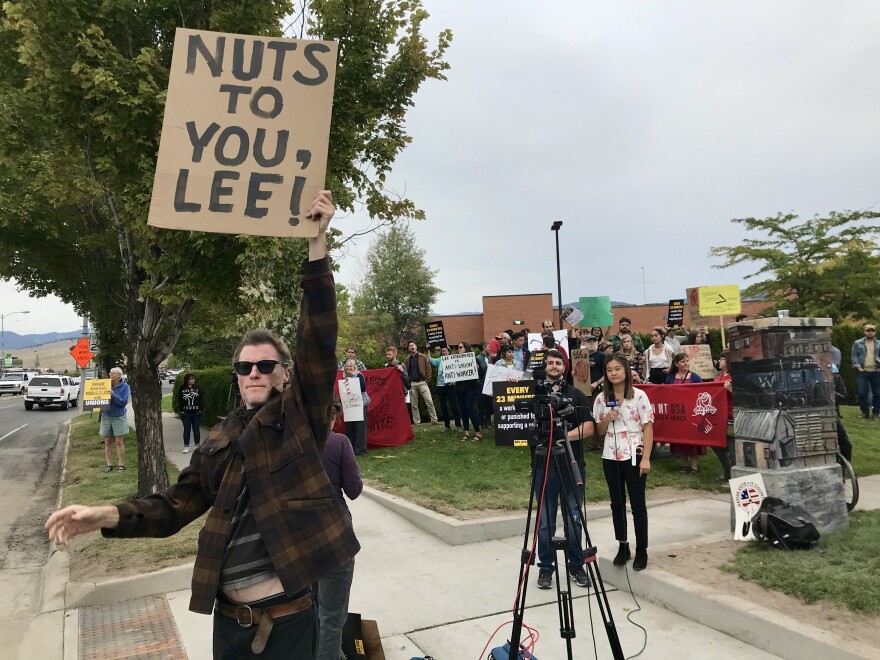Freelance writer Sarah Aswell leans against a big rock near downtown Missoula, Montana.
She’s surrounded by people holding signs and protesting the abrupt closure of the state’s oldest alternative weekly newspaper.
“It feels weird to think about anything except our loss today,” she said .
Aswell writes for the New Yorker, McSweeney's, MAD magazine and, until recently, the Missoula Independent. That paper was the voice of Montana’s weird, artsy side. The one that covered drag shows, local punk bands and the politics of Big Sky Country. Now that voice is gone and Aswell is angry.
“[Lee Enterprises] is someone who doesn’t have the interests of Missoula, Montana in mind,” she said. “They seem to be so focused on profits and the bottom line and not at all focused on getting great journalism out into the world.”
Lee Enterprises owns nearly 50 daily newspapers across the country and hundreds of specialized publications like the Missoula Independent. They’ve been around for more than a century.
Mark Twain used to write for one their papers, but nowadays the company has a lot of debt.
“So the way they make money is by continuing to print a newspaper and paying as few people as little as they can to do it everyday,” said Lee Banville, a media professor at the University of Montana.
According to Banville, Lee Enterprises fell into a deep hole after buying a chain of midwestern newspapers back in 2005.
It promptly assumed a lot of that chain’s debt. Then advertising revenues went down nationally and the Great Recession followed .
Now the company is about $500 million in the hole. But late last year, Banville said it began turning a profit.
“But the way they did that was by essentially reducing staff and cutting costs everywhere they could in every newspaper they own,” he said .
At the same time, top executives got almost $2 million worth of bonuses.
Seth Klamann feels that’s kind of insulting. He’s a reporter with Wyoming’s Casper Star-Tribune, which is also owned by Lee Enterprises.
“At the same time they’re closing the Indy and they’re gutting workforces or newsrooms they give their executives pretty nice bonuses,” he said . “Which would be nice if they did that for people actually producing a product.”
Klamann makes around $32,000 a year. Back in February, he helped his colleagues organize a union to advocate for higher pay and better benefits.
“Maybe then I can buy a house, maybe then I can get married, maybe I can do this or that, maybe I can buy a new car,” he said.
At least three other papers owned by Lee Enterprises have also formed unions, including the Missoula Independent before it was shut down.
Lee Enterprises stresses they closed the alt-weekly because it was losing money, but Banville said the paper’s unionization complicated things.
“Suddenly these, frankly, handful of employees sort of banding together made the economic question of the Indy more complicated,” he said. “So I think rather than address it or really even try something, they were like, ‘well, we could just turn it off.’”
Banville said he doesn’t know if the paper’s closure was a shot across the bow at other unionized newsrooms.
“But I know those newsrooms are keenly aware of what’s happened at the Indy,” he said. “So it’s definitely been taken as a bit of a message by a lot of employees within Lee.”
For his part, Klamann said the alt-weekly’s closure hit close to home, but he believes his paper is profitable.
“I don’t have a realistic concern they would shut down the Star-Tribune,” Klamann said. “If they were going to do it because we unionized I imagine they would’ve already done it.”
In an emailed statement, Lee Enterprises spokesperson, Charles Arms, wrote, “We recognize the rights of employees to unionize and will negotiate with these newly formed bargaining units in good faith.”
He also said the Missoula Independent’s unionization had nothing to do with its closure.
Freelance writer, Sarah Aswell, says regardless, Montana’s second largest city is losing a home for creative minds and a source of hard-hitting journalism.
“I feel like the whole system is kinda broken at this point,” she said. “It needs to change and I’m not sure how we make those huge, systematic changes.”
According to a report by the University of North Carolina, since 2004, more than 50 daily newspapers have disappeared across the U.S. and newsroom workforces have been slashed almost in half.
This story was produced by the Mountain West News Bureau, a collaboration between Wyoming Public Media, Boise State Public Radio in Idaho, Yellowstone Public Radio in Montana, KUER in Salt Lake City and KRCC and KUNC in Colorado.




